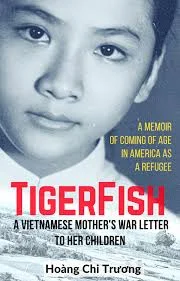Hoàng Chi Truong begun writing her memoir TigerFish, for her young daughter, to chronicle the family’s journey from war-torn Vietnam to the United States, their diaspora and acculturation process. Along the way, her story has become a form of advocacy, giving a voice to the marginal refugee communities within society.
Please give us a brief overview of yourself and your work.
As a writer, I love sharing stories and lessons I’ve learned from my life – from my experience as a refugee to debt-free living and minimalism to mindful living and travel – to help others make the most of their beautiful life. My mission is to advocate and bring awareness to the issues of refugees in America, by using my personal narrative as a teenage refugee from Vietnam in 1975, in my autobiographical novel, TigerFish. My parents started all over again financially in America and, through hard work and persistence, we achieved our slice of the American dream. I strive to be a minimalist, practicing mindful living and staying within our means, to achieve financial freedom to pursue our life's passions.
One of my lifelong goals has been to share my journey to America as a refugee. In writing my story, I share vignettes of my childhood in Vietnam, family struggles, losses, and heartaches, as we made our way to America while I was coming of age. My autobiographical novel chronicles my upbringing, our diaspora, and my acculturation process and duality between home life and school life, between Eastern and Western cultures, and between Confucianism and Western modernity.
What made you want to be a writer? How did you begin writing?
I read and write starting as a child in Vietnam, in Vietnamese. There were many writing competitions for as class projects as well as school-wide contests. Both writing and reading have been an important and major part of my young and adult life.
I’ve made a conscious decision to finally publish TigerFish, the book I started writing 24 years ago to fulfill my life’s goal and mission. To accomplish this, I needed to focus on it entirely, and this past June, I resigned from my job and made a commitment to work solely on the book to prepare it for publication.
What inspires you to write?
Early childhood reading influenced my desire to write.
Is there any particular incident that has happened along your writing journey that you’d like to share?
I started writing stories and poems in Vietnamese when I was about ten years old. I loved to draw comics as well. In our high school in Vietnam, we had newspaper writing projects for each class and one for our entire school where everyone could participate and submit our writing and drawings. That was the beginning of my love for writing.
My love for books started very early in life. It's where I found solace, entertainment, and armchair traveling to faraway safari and Arabian desserts in books like the 1001 Arabian nights. Reading has shaped my writing voice and style, and it has helped me navigate through some tough times in my life.
I started writing my autobiography TigerFish when my daughter was two years old. I was compelled to document my upbringing in Vietnam for our family history, so she would one day learn about my childhood, her grandparents, aunts, and uncles. I wanted her to have vignettes of my childhood, of the sights and sounds, the comfort and joy as well as the pain, trials, and tribulations not just for me, but for my whole family, from my perspective. I wanted to pass on our war-torn history and daily lives, how it affected my views of the world and the ensuing diaspora that lead to the long assimilation process.
I started writing the book 24 years ago and finished around 2001, but I wasn't actively looking for an editor to help me with editing and publishing. It seemed daunting at the time because I started working full-time again and had kids in Jr. High and High school to raise. Currently, I’m taking a break in my career to finish what I started so long ago because postponing it is no longer an option for me. My history is no longer mine to keep; it's a story that needs to be told not only of my immediate family but the bigger Vietnamese refugee community, to add to the national conversations relating to the current Syrian refugee crisis, and to contribute to our American oral history archives. And to a larger extent, I’d to speak for the marginal communities who suffer economically and are socially stigmatized. For example, the homeless veterans or the disadvantaged inner city populations, just to name a few, because having lived as a refugee, I can understand to some degree what they are going through daily.
Do you have any advice for aspiring authors?
1) Read a lot. That's how I learned my voice and style.
2) Write. Start writing now and write every day. I know it's an old piece of advice, but it's enduring for a good reason. Good writing takes discipline just like artwork, music, sports, or academic pursuits.
3) Take writing classes to learn pitfalls and how to improve your writing.
4) Get advice and feedback from other people so that we're not writing in a vacuum.
5) We need to know what readers want to learn and how they want to be entertained.
6) Writing is a solitary pursuit so stay connected with other writers and have a mentor if possible. I don't have a mentor and would love to find one, but I feel like my mentors are the authors whose books I've been reading since I was a child. They are my collective guides.
Other daily writing tips:
Tip number 1: get into a mindset and set goals of how much you need to get done and discipline yourself to sit down as scheduled daily. Turn off every possible distraction, turn on mood music, and the words will pour out.
Tip number 2: I think of the big picture and the grand prize so I can push through any obstacles.
Tip number 3: I always write with my readers in mind, providing them value whether it’s entertainment or valuable information on a subject. I ask myself what would the readers want to learn or to know. In writing my autobiography, I want to give them the feelings that they were there, experiencing life as it was for me to the sights, sounds, tastes, smells, etc. That's why I love to steep in descriptive words with the sole purpose of bringing my readers through my journey.
What do you think is the biggest marketing challenge for new authors?
There are 3 stages in marketing books: 1) Making a connection with ideal readers prior to the book launch, 2) Promotion and selling near book launch, 3) Continuing connection with readers after the book launch. For new authors, most do not want to work on the finding and connecting with readers via social media or building a list of subscribers; instead, they focus on selling the books at the launch when the relationship and trust have not been established.
What methods of book marketing do you find the most effective?
I’m using social media to connect with my identified ideal readers and building a subscribers mailing list to build my relationship and a community with them. I intend to use Amazon and my website to market my book while taking out ads on Facebook, Twitter, Instagram, Pinterest, and GoodReads.
How do you handle rejection as a writer?
I’ve accepted it as a part of my work and it’s an incentive to learn more about matching my niche to the publishers, tailoring the same message with a different approach to resonate better with the audience.
Is there anything else you’d like to share with aspiring writers?
Read print media every day and build writing into your daily routine to find your voice.
Don’t get discouraged.
Don’t listen to nonconstructive criticism or self-doubt.
Pay attention to the books you like and write down the reasons for your preference. Besides the plot, was it the dialogue, humor, descriptive writing? Is it a style that you would like to model after?
Keep notes of topics for articles, book titles, and daily journal/photos (for memoirs later in life).
Follow Hoàng Chi Truong’s work via her website and social media channels: Twitter, Pinterest, Instagram and Facebook.














